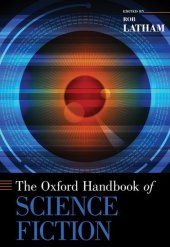 Neuerscheinungen 2014Stand: 2020-02-01 |
Schnellsuche
ISBN/Stichwort/Autor
|
Herderstraße 10
10625 Berlin
Tel.: 030 315 714 16
Fax 030 315 714 14
info@buchspektrum.de |

Rob Latham
The Oxford Handbook of Science Fiction
Herausgegeben von Latham, Rob
2014. 640 S. w. 35 illustr. 258 mm
Verlag/Jahr: OXFORD UNIVERSITY PRESS; OUP USA 2014
ISBN: 0-19-983884-4 (0199838844)
Neue ISBN: 978-0-19-983884-4 (9780199838844)
Preis und Lieferzeit: Bitte klicken
The Oxford Handbook of Science Fiction encompasses the genre´s development in a wide array of media that includes literature, film, comics, and television.
The Oxford Handbook of Science Fiction attempts to descry the historical and cultural contours of SF in the wake of technoculture studies. Rather than treating the genre as an isolated aesthetic formation, it examines SF´s many lines of cross-pollination with technocultural realities since its inception in the nineteenth century, showing how SF´s unique history and subcultural identity has been constructed in ongoing dialogue with popular discourses of
science and technology. The volume consists of four broadly themed sections, each divided into eleven chapters. Section I, "Science Fiction as Genre," considers the internal history of SF literature, examining its characteristic aesthetic and ideological modalities, its animating social and commercial
institutions, and its relationship to other fantastic genres. Section II, "Science Fiction as Medium," presents a more diverse and ramified understanding of what constitutes the field as a mode of artistic and pop-cultural expression, canvassing extra-literary manifestations of SF ranging from film and television to videogames and hypertext to music and theme parks. Section III, "Science Fiction as Culture," examines the genre in relation to cultural issues and contexts that have influenced it
and been influenced by it in turn, the goal being to see how SF has helped to constitute and define important (sub)cultural groupings, social movements, and historical developments during the nineteenth, twentieth, and twenty-first centuries. Finally, Section IV, "Science Fiction as Worldview,"
explores SF as a mode of thought and its intersection with other philosophies and large-scale perspectives on the world, from the Enlightenment to the present day.


